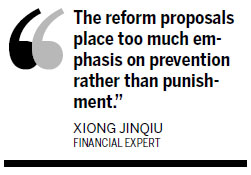IPO reforms draw skepticism in some quarters

Reforms are in the works for initial public offerings on the Chinese mainland stock exchanges, after a nine-month suspension of new issues, but industry experts do not expect a fundamental improvement in the listing process from the proposed changes.
On June 7, the China Securities Regulatory Commission released a draft set of IPO reforms for comment by financial institutions.
Market participants believe the reform proposal is a signal that the IPO moratorium, which began in November, will soon end. There are at least 677 companies waiting for their chance to be listed.
The draft reforms aim to address longstanding problems such as price manipulation and window-dressing of prospectuses.
The reforms require issuers to release a prospectus simultaneously with their IPO applications to increase transparency.
Underwriters should release evaluations of each issuer's performance, written in plain terms that smaller investors can easily understand. In each case, they must continue due diligence investigation of the issuer in case the company reports bad results not long after obtaining IPO approval.
Experts have welcomed the CSRC's efforts to enhance transparency. But many expect tougher measures to combat fraud.
The draft states that if major shareholders, members of the board or senior managers sell their shares within two years after the lock-up period, the sale price shall not be lower than the issue price.
Moreover, they must have a five-year contingency plan in case the stock price falls below net assets per share.
Pi Haizhou, an independent columnist, said that the CSRC's effort to squeeze "bloated" IPO prices, though well-intentioned, exceeds its responsibility, since no one can guarantee that a stock won't fall below its issue price. As a result, it's unreasonable to demand major stakeholders sell their shares at a price not lower than the issue price.
Ye Tan, also an independent columnist, said the reform attempt doesn't really address price differences between the primary and secondary markets.
Participants in the primary market often sell their shares to secondary-market investors at a profit. This is difficult for the buyers to determine. Primary dealers can collude to hide their original acquisition prices from buyers in the secondary market.
Ye suggested that the commission should clarify the penalties for "buying low and selling high" to deter rule breakers.
- Chinese shares jump over IPO delay reports
- Smithfield's China bidders plan HK IPO after deal
- China shares close lower over massive IPO fears
- PwC: HK IPOs expected to boom this year
- IPO door re-opens
- IPOs likely to resume in H2
- Stocks regulator denies IPO resumption rumors
- Lack of liquidity, IPO concerns push stocks to six-month low

























